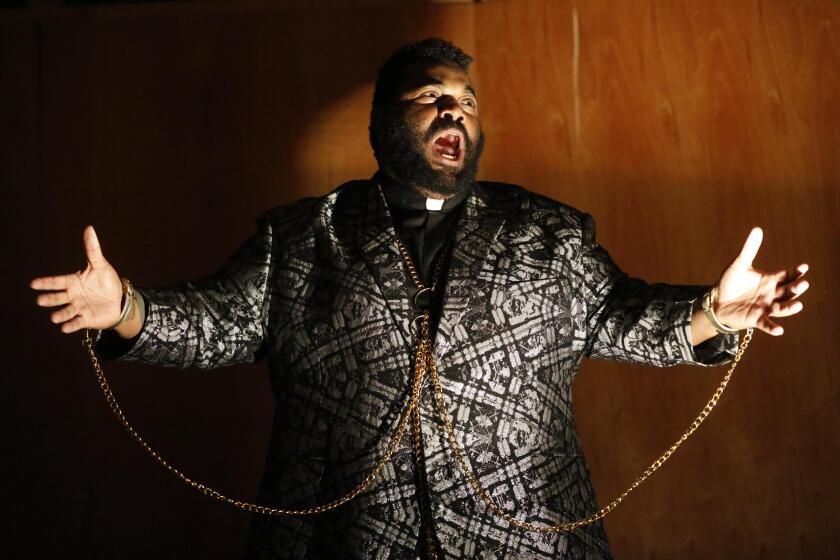‘Sweet Land’ astonishes. Opera in an L.A. park examines what it means to be American
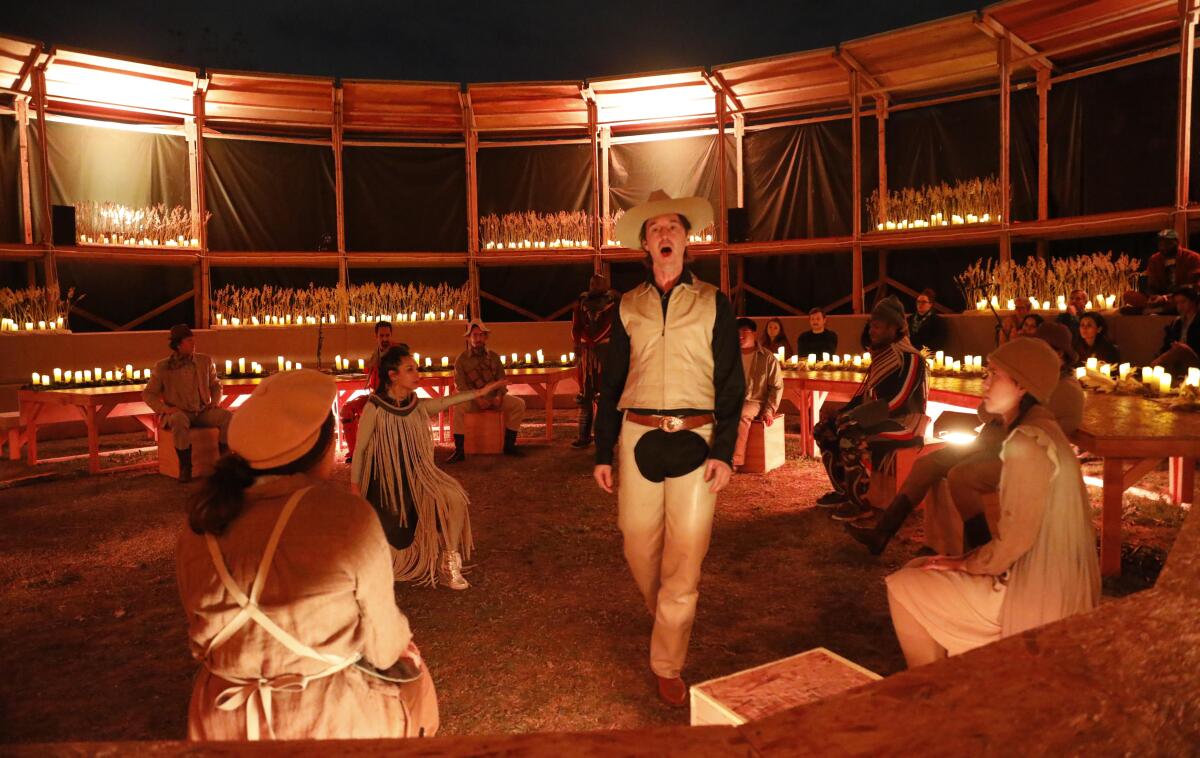
- Share via
“Sweet Land,” the new, tenaciously uncategorizable opera by Yuval Sharon’s doggedly unorthodox opera company, the Industry, is not sweet. The land on which it is performed, Los Angeles State Historic Park north of downtown, is no longer sweet.
The experience of attending “Sweet Land”: not sweet. Dress warmly. You’ll be outdoors 90 minutes in early evening and at night, and the park gets a lot colder than you might expect. It might even rain, and that’s your tough luck, because you’ll still have to go through with this.
Negotiating the pop-up venues for “Sweet Land” can get a little tricky. There are steps to trip on in the dark. It is easy to scrape yourself on raw lumber. There are no amenities, no opera house coddling. No wine bar, chocolate, coffee or much of anything.
Prepare for all of that, and then prepare for subject matter that is anything but sweet. Prepare for the world we live in, the place we inhabit and the progress we hope for it to lose a significant amount of its sugar content. If you love Thanksgiving, prepare to no longer know what that even means.
.
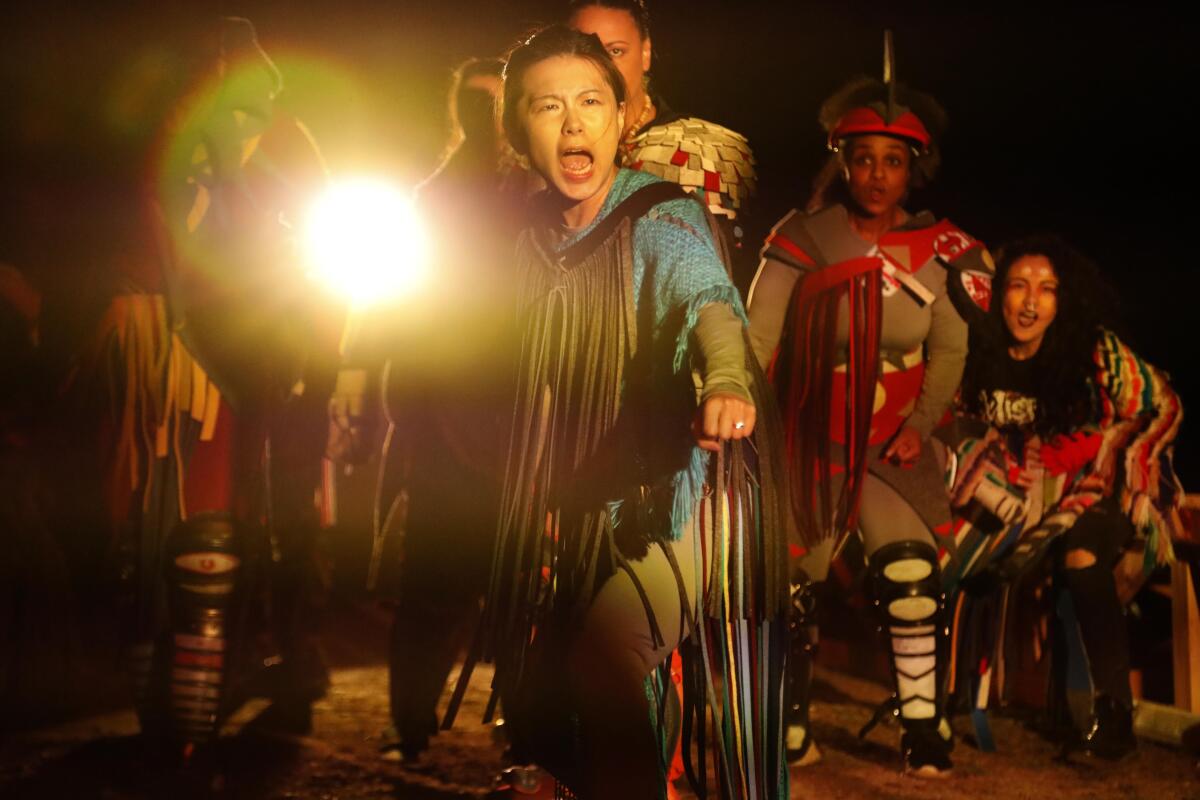
“Sweet Land” is opera as astonishment. To say that Sharon has changed the operatic landscape by changing the physical landscape of opera is glibly obvious. That is what he has done but in ways — musically, visually, theatrically, environmentally, historically — that are not glib and far from obvious.
So, what is “Sweet Land”? It’s too early to say, which is one of its many remarkable and remarkably confusing glories.
It follows directly with what Sharon, as an inveterate disrupter, has been up to from the start with the Industry. He may be invited to the toniest opera houses in Berlin, Vienna and Bayreuth, but at home in L.A. he’s made opera in a warehouse, Union Station and, famously with “Hopscotch,” in limousines and outdoor sites around central L.A. He’s tended toward outsider composers, outsider poets, outsider visual artists as well.
He is not driven by narrative alone but by image and idea and place and purpose and sound and soul and the latest ideas in critical theory and avant-garde art and music, with some popular culture thrown in. He is also driven by making opera the art form of the impossible, getting city fathers and mothers to condone violations of regulations. He has won over local arts patrons who are indispensable in funding the Los Angeles Philharmonic, Los Angeles Opera, Long Beach Opera and various new music ventures around town. Sharon’s winning support for “Sweet Land” after the inchoate, disaster-seeming first workshop was persuasive power of genius (yes, he has MacArthur).
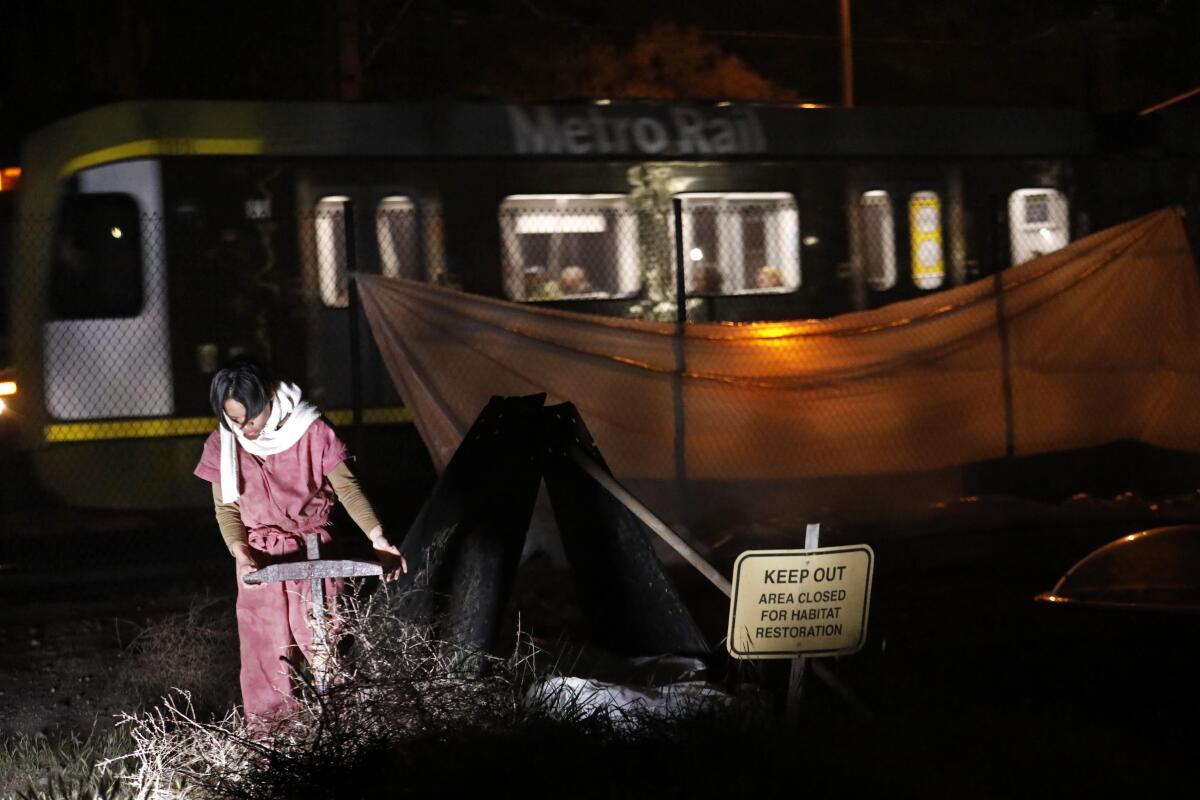
“Sweet Land” is America before and after colonization. Kind of. There is the native population, the Host community. There are the Arrivals. But there is also the land, its Nature and mystical spirit. The Hosts recognize that spirit, but even they have an uneasy relationship with it. The Arrivals are, of course, despoilers.
An opera of pairs, “Sweet Land” has two composers. Du Yun, who arrived in the U.S. from China and has quickly moved up the avant-garde ranks. In the next months, L.A. Opera will mount her Pulitzer Prize-winning “Angel’s Bone,” and she will be featured with a new work in an L.A. Phil Green Umbrella concert. Raven Chacon is a Native American artist with CalArts composition credentials and a background in installation, performance and film. The composers, while highly individual and attuned to each’s respective cultures, have a sophisticated sense of the abstract sonic potential of music. Both are superb sound artists.
There are two librettists. The African American poet Douglas Kearney collaborates with Chacon. The part-Ojibwe poet Aja Couchois Duncan wrote the texts for Du Yun. There are two directors — Cannupa Hanska Luger and Sharon — and two scenic designers, Tanya Orellana and Carlo Maghirang. It is seldom possible to keep track of any of this.
There are even two operas with common points. The audience meets in a central space of bleachers. (The pop-up “Sweet Land” set is made of wood, gorgeously raw and elegant and tactile, splinters included.) A transparent sheet serves as curtain on which there are projections. We’re welcomed by singing Coyotes (Carmina Escobar and Micaela Tobin), who look part punk and part wild beast and who are only partly welcoming (while also partly crazily threatening). All the eye-popping costumes are by E.B. Brooks and Luger. The crucial choreographer is Tonantzin Carmelo.
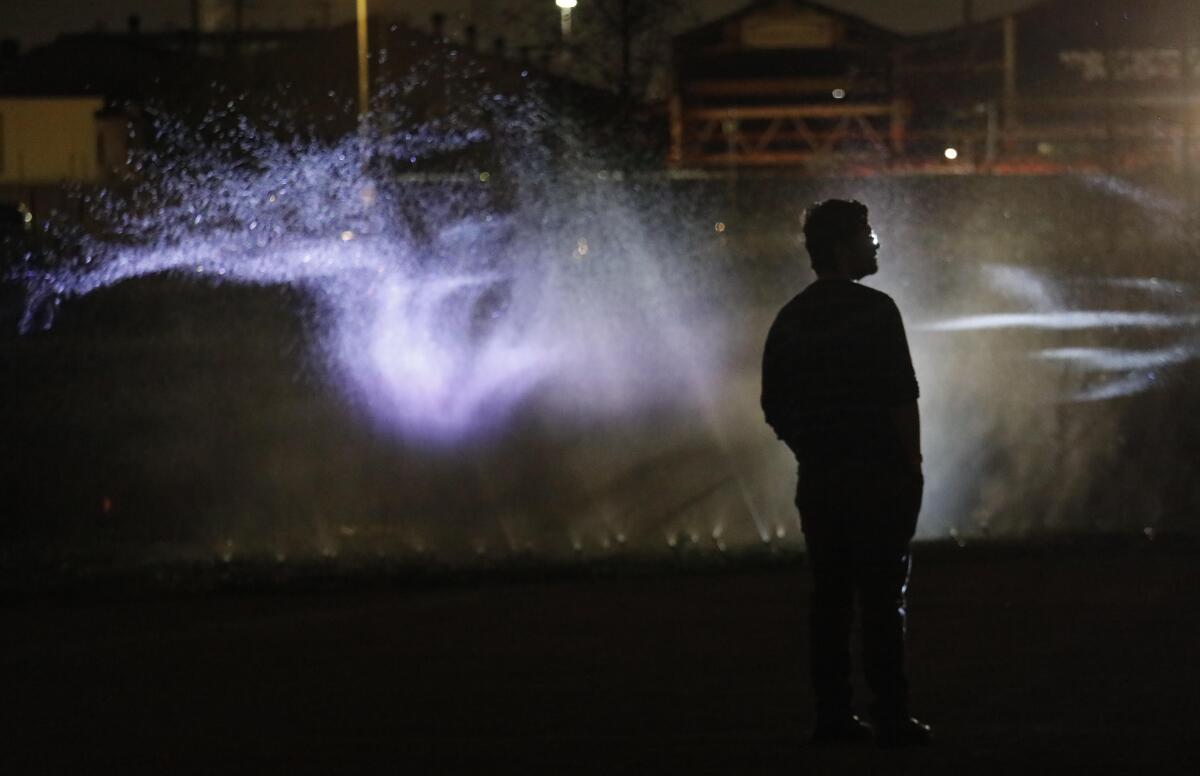
Hosts welcome Arrivals as guests. Drumming and eerie vocal writing come from both composers. Helicopters occasionally fly over the park and drown everything out, a threat to art. Metro trains occasionally whiz by.
One part of the audience heads off to the “Feast,” the other to the “Train.” Everyone then meets in the middle “Crossroads,” an open space overlooking the downtown skyline where the Coyotes cavort and projections appear on water from sprinklers — pure magic.
Audience members return to “Feast” or “Train” to find everything changed. As they return to the bleachers for a communal finale, the land looks different, sullied. Songs of sorrow are what we hear. The texts appear as spectacular projections, near and far, including on a bridge and on a billboard (how did Sharon get away with that?). The texts remind us of America’s violent past of slavery and persecution. When a Metro train comes by again, it isn’t so innocent. Nothing is innocent.
“Feast” and “Train” are both vehicles for uncertainty. Each takes place in a wondrously carpentered circular space, open to the sky.
With a creative team of Native, Chinese and African American artists, ‘Sweet Land’ revisits the founding of America through a different lens.
For “Feast” we sit at tables facing glum, Puritan-seeming Arrivals. The Hosts are flamboyant and joyous. Du Yun is the composer of unearthly ceremonial music, and Jenny Wong conducts a small ensemble. The Coyotes roam. Before long, the Arrivals abuse their Hosts, telling them their way of life must end. Jimmy Gin (Scott Belluz) forces Makwa (Kelci Hahn) to be his bride.
After the communal meeting at the Crossroads, we return to the “Feast” theater to find the physical and metaphorical tables have turned. Makwa, and the Hosts, are victims. Here, Chacon delivers a musically violent turn.
The part of the audience ushered to “Train,” meanwhile, sit on swivel chairs around a central orchestral ensemble conducted by Marc Lowenstein. Chacon provides the propulsive music. Preacher (Richard Hodges) provides the soundtrack for Manifest Destiny. The Arrivals push for modern technology; the Hosts attempt to retain their own.
After gathering at the crossroads, the “Train” audience returns to see the country on the way to “progress.” The Arrivals boast that they have taken everything they want, everything they need. Du Yun’s score is again ceremonial, but now sounding more like a sad, angry requiem.
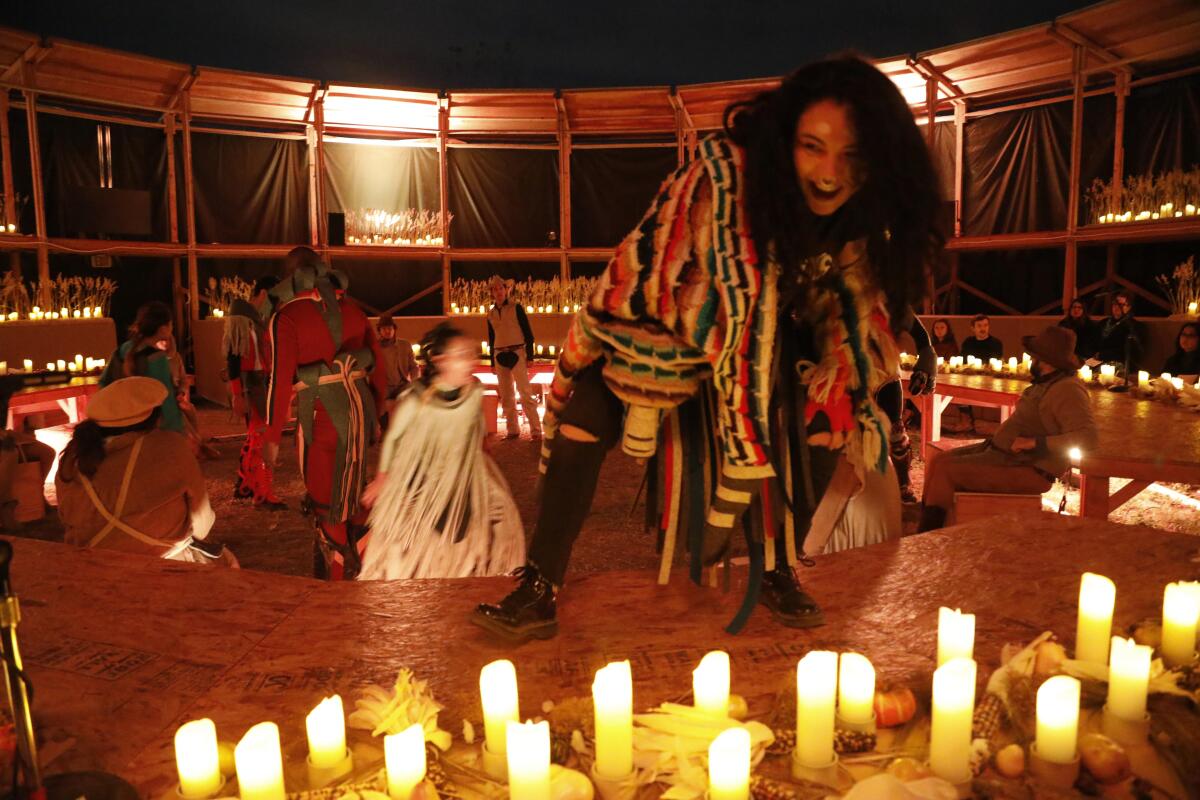
But it’s not that simple. Too many words haunt with double meanings. The composers employ the most advanced techniques of modern music and technology to reach back to the sonic essence of what we’ve lost. The visuals are dazzling as primitive art and modern art. Everything happens under our noses, and the large cast is, to a singer and dancer, exceptional. So much happens that we forget.
Once back to “Feast” or “Train,” you simply have to no opportunity to remember what was because you are bombarded by what is. Past and present, mythic land and “Sweet Land” and the land which we occupy become one and confused.
Who are we, the public? Are we now the Hosts, and are new immigrants the Arrivals, thus the threat to our way of life? Or are we still the Arrivals, and are immigrants the original Hosts returning to take back a sweet land? Or is it something very different, where we’re all in this together as progress threatens us all alike, and no one knows what to do?
Can this ritual opera open our eyes and ears and spirits? You can attend “Sweet Land” at dusk or in the dark. You’re not recommended to see both versions on the same day. You need time to think and to absorb. With every art form at his disposal, Sharon has made that — and opera! — essential.
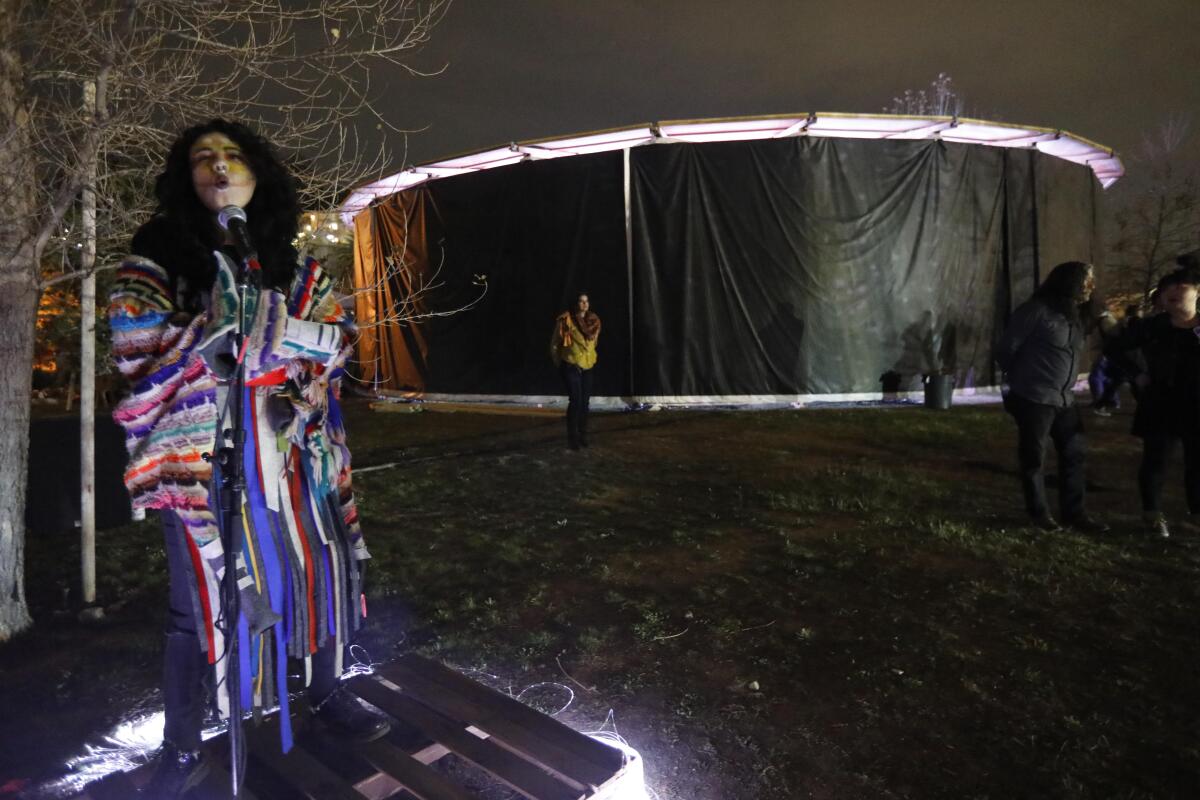
'Sweet Land'
Where: Los Angeles State Historic Park, 1724 Baker St., L.A.
When: 6 and 8:30 p.m. Friday and Saturday; 5, 6:30 and 9 p.m. Sunday; 6:30 and 9 p.m.; 5, 6:30 and 9 p.m.
Tickets: $75-$110
Info: (213) 761-8598; theindustryla.org
Running time: 1 hour, 30 minutes
More to Read
The biggest entertainment stories
Get our big stories about Hollywood, film, television, music, arts, culture and more right in your inbox as soon as they publish.
You may occasionally receive promotional content from the Los Angeles Times.
